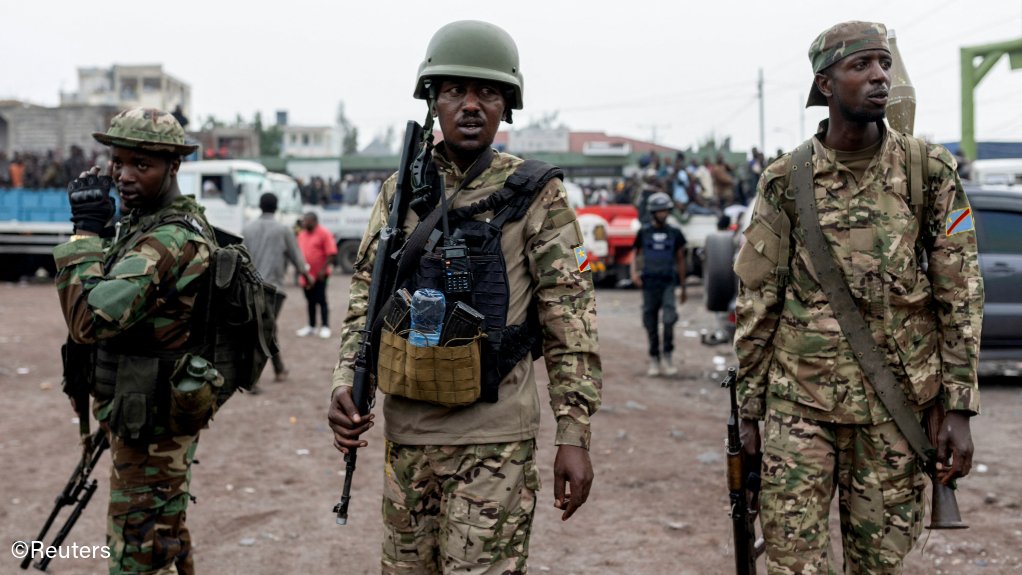Rwanda-backed rebels in the eastern Democratic Republic of Congo (DRC) have advanced southward, reaching Burundi’s border and bringing the central African region to the brink of war, the United Nations said.
M23 rebels continue to take new territory, seizing the town of Kamanyola on Tuesday at the intersection of Congo, Rwanda and Burundi, according to Bintou Keita, the head of the UN’s peacekeeping mission in Congo.
“It is imperative that this council takes urgent and decisive steps to avert a wider regional war,” Keita told the UN Security Council in an emergency meeting on Wednesday.
Over the past three weeks, M23 and Rwandan troops have captured two major cities — Goma and Bukavu — in eastern Congo. They overpowered Congo’s army, allied militias, peacekeepers from southern Africa and the UN, as well as Burundian soldiers. The fighting has left thousands dead and forced nearly a million people to flee their homes.
Rwanda has been impervious to widespread demands for a ceasefire, and the M23 offensive has raised concerns about the country’s ultimate goal. Rwanda invaded Congo twice in the 1990s to overthrow its government.
“We are not aware of the intricacies of the M23 agenda and do not really know the intention of their backers and neither do we know how far they will go or why,” Huang Xia, the UN special envoy to the Great Lakes region of Africa, told the Council.
Congo Foreign Minister Therese Kayikwamba Wagner called the M23 “a political project aimed to topple our government by force,” and demanded that the UN sanction Rwanda.
“This Council observes, this Council condemns, but this Council does nothing,” she said. “This Council is still twiddling its thumbs. But it’s the only body able to prevent new massacres and the spread of the occupation.”
The emergency meeting on Wednesday was the third in a month, and Congo is pushing for more concrete action from the Council.
Rwandan President Paul Kagame has repeatedly denied that his government supports the M23 and says he doesn’t know if his troops are in Congo.
“Our sole priority has been and will always remain the security of our borders and the stability of our nation,” said Ernest Rwamucyo, Rwanda’s ambassador to the UN.
The M23 claims it’s protecting the rights of Tutsis and other speakers of the Rwandan language in Congo. It’s also fighting against a Hutu rebel group known as the Democratic Forces for the Liberation of Rwanda, or FDLR, whose founders participated in the 1994 Rwandan genocide.
“The M23 issue is about people fighting for their rights and survival, fighting for their inherent citizenship rights, and access to their own ancestral property,” Rwamucyo said.
A split emerged on the Council about how to characterise Rwanda in any new resolution condemning the war.
Rwamucyo called for African solutions to the problem and criticized Congo for lobbying Western governments to cut aid to his country.
Congo’s Wagner lashed out at African members of the Council — Somalia, Algeria and Sierra Leone — for not condemning Rwanda in their joint statement to the UN’s top body.
“Standing by silently while civilians are killed is not a solution, and certainly not an African one,” Wagner said.
The Trump administration is prepared to work with the Security Council on a sanctions package, according to the US interim chargé d’affaires to the UN, Dorothy Shea.
“For months we have consistently watched M23 and Rwanda ignore ceasefires, seize territory under false pretext and deny intention of further expansion only to start the cycle anew,” Shea said.
The British government is also considering “the possibility of a review of all UK support to Rwanda,” said James Kariuki, the country’s deputy representative to the UN.
At the same time, tensions between Rwanda and Burundi continue to rise. The two countries have accused each other of supporting rebel groups in Congo opposed to their respective governments.
Rwamucyo said Burundian forces “share the same ethnic ideology as the FDLR,” the Hutu extremist group that Rwanda has pledged to eradicate.
In a statement to the Council, Burundi urged for urgent intervention to prevent an expansion of the war.
“No one would be able to accurately predict the security and humanitarian consequence of that in the region; there could even be ramifications for other regions of the continent,” Burundi’s UN representative Zephyrin Maniratanga said.
EMAIL THIS ARTICLE SAVE THIS ARTICLE FEEDBACK
To subscribe email subscriptions@creamermedia.co.za or click here
To advertise email advertising@creamermedia.co.za or click here











